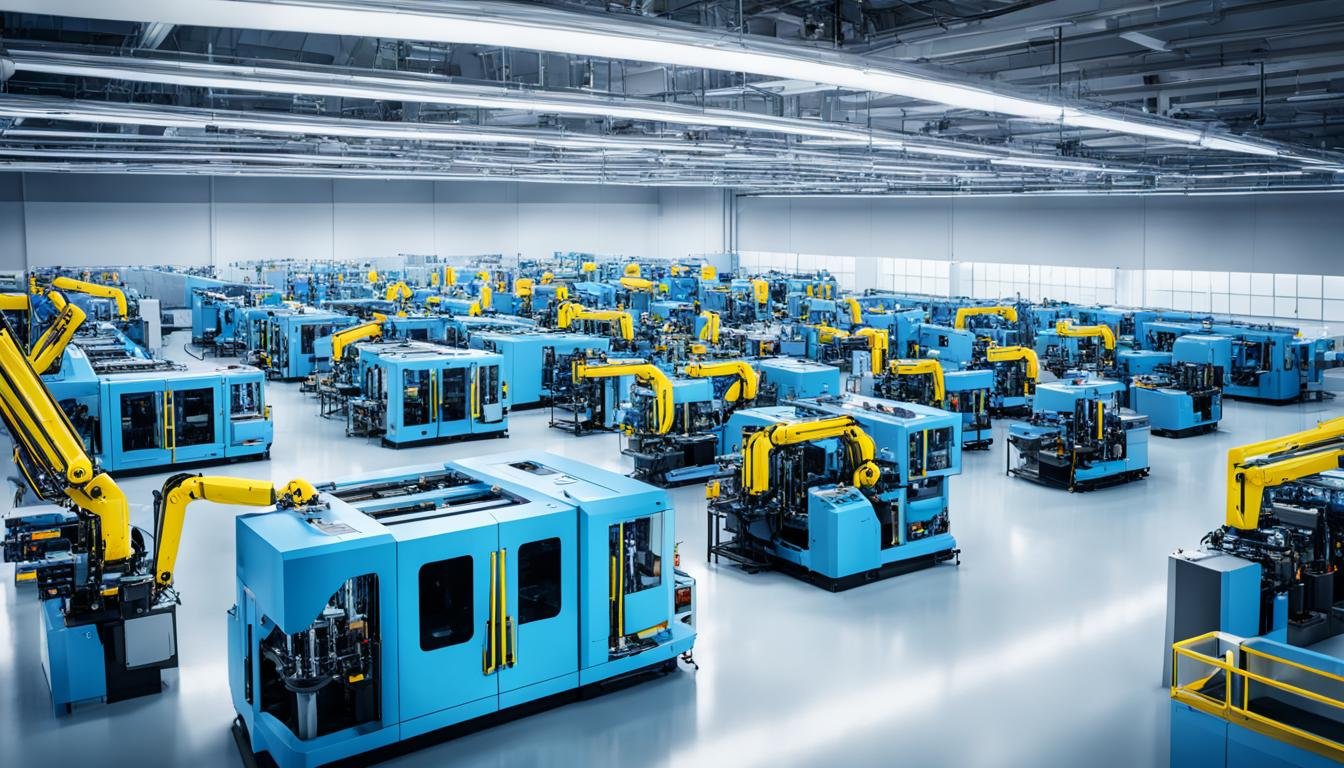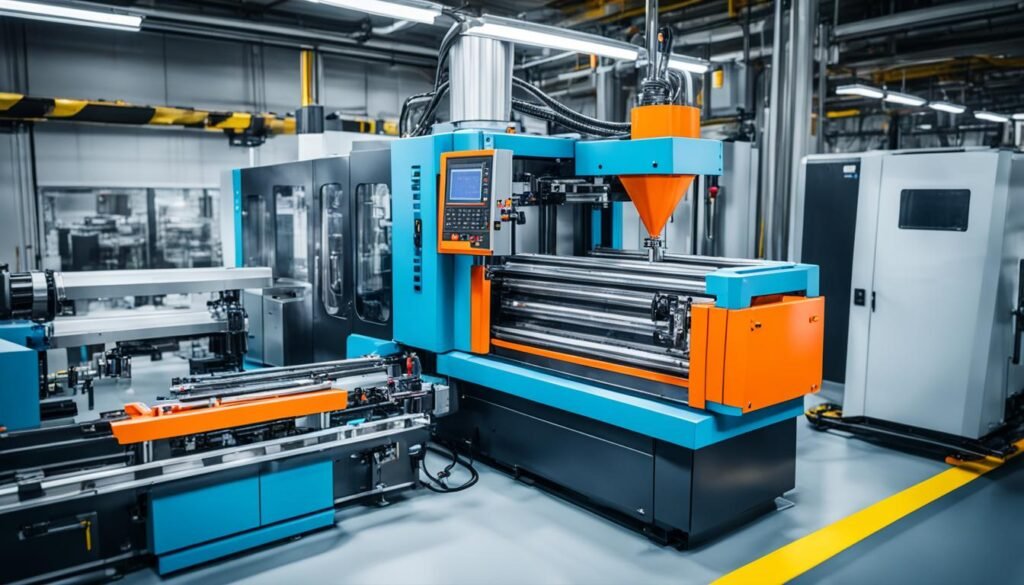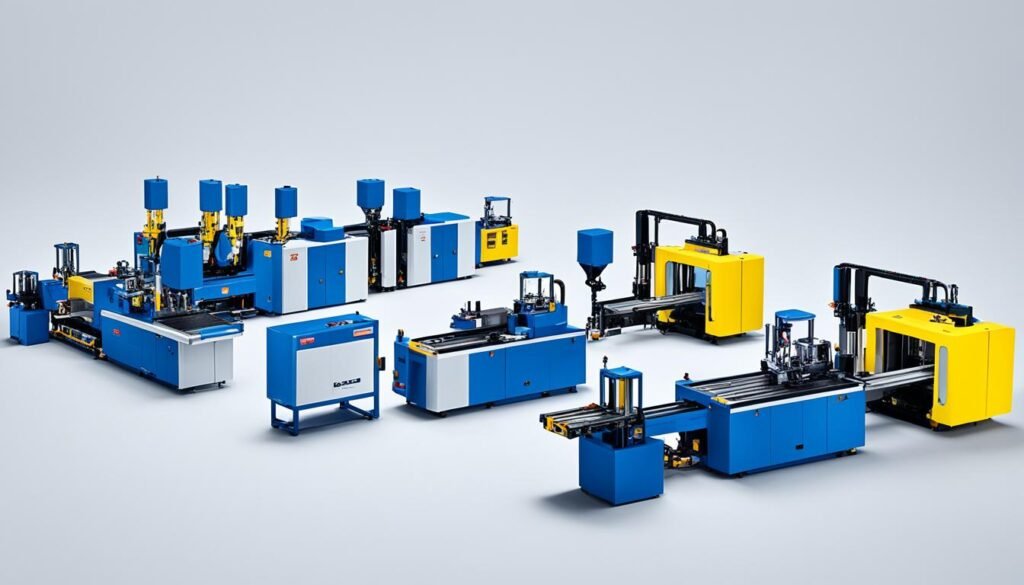Email:
info@miocuisine.com

In plastic manufacturing, injection molding machines are key. They make high-quality parts efficiently. Thanks to them, the industry can make detailed parts in large numbers. Some brands and models are known for being innovative and dependable.
Arburg, a German company, has led injection molding equipment innovation. They brought us the first two-color injection molding machine in 1962. In 1982, they introduced machines with a graphical interface. That made operating them much easier.
Another leader is Nissei Plastic Industrial from Japan. They created the first all-electric injection molding machine in 1983. It improved how efficiently and precisely machines could operate.
Husky Injection Molding Systems leads in making machines for PET preforms. These machines help make plastic bottles and containers. Haitian International is the biggest injection molding machine maker in the world. It has over 7,000 employees and is in 130 countries.
Other top makers include Milacron, Sumitomo Demag, Engel, and more. They make systems for different industries. This includes cars, medicine, packaging, and more.

Plastic injection molding machines are key in making many plastic items we use. They can create complex parts with precision. These machines work by forcing hot liquid plastic into a mold to shape the parts.
The method came from making metal parts over a century ago. In the 1920s, it started being used for plastics, first with simple molds. Now, we have advanced machines that can make a huge range of plastic products.
Almost everything we use has plastic parts made through injection molding. It’s an adaptable process, allowing for a wide range of shapes and features. This includes using different colors, textures, and functions.
Plastic injection molding offers many benefits. It’s cost-effective, fast, and creates little waste.
The market for injection molded plastics is growing fast, with new technology leading the way. Demand for plastic parts continues to rise in many sectors. This drives the need for better machines and materials.
New plastic injection machines are now more energy-efficient than before. They produce fewer defects, ensuring product quality. This trend will likely continue, as companies seek to improve how they make plastic items.
| Thermoplastic Material | Characteristics | Common Applications |
|---|---|---|
| Acrylonitrile-Butadiene-Styrene (ABS) | Strong, rigid, and impact-resistant | Automotive parts, electronic housings, toys |
| Nylons (PA) | Tough, wear-resistant, and heat-resistant | Gears, bearings, automotive components |
| Polycarbonate (PC) | Transparent, impact-resistant, and heat-resistant | Automotive lighting, safety glasses, medical devices |
| Polypropylene (PP) | Lightweight, chemical-resistant, and flexible | Packaging, household items, automotive interiors |
Different plastics are suited for making different things due to their properties. For example, PC is clear and strong, used for eyewear. Knowing which plastic to use for which part is key to success.
The future of plastic part making is bright. With new technologies and a focus on being eco-friendly, the industry is set to thrive. Plastic injection molding is crucial to making many products we use daily.

There are different types of injection molding machines. Each has its own benefits and uses. The main kinds are hydraulic, electric, and hybrid models. Knowing about these types can help us pick the right one for what we need.
The hydraulic machine type is the most common. It uses pressure from fluids to work. They are great for making things with high force. These machines can work with many materials and sizes.
They are often used for making a lot of items at once. Hydraulic machines can go from making small pieces to very large ones. They can be used for projects needing up to more than 4,000 tons of force.
Electric machines are controlled by special motors. They are precise, quick, and save energy. These are best for very detailed, exact parts. Electric systems have several benefits over hydraulic ones. For example, they use less power, are more accurate, and work quietly. They also make the work environment cleaner.
Hybrid machines mix the good points of hydraulic and electric machines. They use electricity to inject the material but need fluids to close tightly. This mix brings together precision, speed, and saving energy. These machines are great for projects that need both strong force and fine control.
When we pick a machine, we need to think about our project’s size and how detailed the parts must be. We also need to look at how much force we need and how many parts we’ll make. The table below shows the key points of each machine type:
| Machine Type | Clamping Force | Precision | Energy Efficiency | Applications |
|---|---|---|---|---|
| Hydraulic | High | Moderate | Low | Large-scale production, high-volume parts |
| Electric | Moderate | High | High | High-precision parts, clean room environments |
| Hybrid | High | High | Moderate | Complex parts, balanced performance |
At Kaysun, we have many kinds of machines for your needs. Our machines vary from 35 to 940 tons. We focus on precise electric models. By picking the right machine for your job, you can make sure you get the best quality parts.
Choosing an injection molding machine is crucial for performance and cost-efficiency. Key aspects are clamping force, injection unit size, and how precise the machine can be. Recognizing these factors helps pick the right machine for specific projects.
Clamping force determines how big and complex the molded parts can be. It is controlled by the part’s area, cavity pressure, and material factors. Enough clamp tonnage helps maintain quality and avoids defects.
The size of the injection unit affects how much plastic can be used for each shot. For larger products, you’ll need a larger machine. The injection volume accounts for material shrinkage. So, ensure the unit can handle your production needs.
Precision is key in molding, making sure parts are made to exact specifications. Electric molding machines and hybrids between hydraulic and electric are known for their control precision. When picking a machine, look at injection pressure and speed for quality and efficiency.
Reducing energy usage is important for cutting costs and being greener. Electric machines are more energy-efficient than hydraulic ones. Hybrids also offer good energy use. Choosing an efficient machine helps with long-term savings and sustainability goals.
| Machine Type | Clamping Force | Energy Efficiency | Precision |
|---|---|---|---|
| Hydraulic | High | Low | Moderate |
| Electric | Moderate | High | High |
| Hybrid | High | Moderate to High | High |
Thinking about clamping force, unit size, precision, and efficiency is crucial. It helps improve efficiency, quality, and saves money in the long run.
Looking for the top injection press suppliers means checking out the best molding machine brands and plastic equipment makers. These industry giants shine thanks to their advanced tech, quality machines, and worldwide reach.
Haitian International is the biggest, making $2.5 billion in revenue. Since 1966, it serves 130 countries with 6,600 employees. Their affordable Mars and Jupiter series machines are very popular.
ENGEL from Austria is a big name too, earning $1.5 billion. Since 1945, it’s been in 14 countries with over 7,000 staff. ENGEL makes a variety of machines, from small electric ones to huge ones, with forces from 280 kN to 55,000 kN.
| Manufacturer | Revenue (Billion USD) | Founded | Employees | Operating Countries |
|---|---|---|---|---|
| Haitian International | $2.5 | 1966 | 6,668 | 130 |
| ENGEL | $1.5 | 1945 | 7,000+ | 14 |
| Milacron | $1.258 | 1884 | – | 18 |
| ARBURG | $0.578 | 1923 | – | 35 |
Other big names in plastic manufacturing area:
Many popular suppliers are in China, like Arburg Machinery (Shanghai) Co., Ltd and more. They’re well-searched on Google.
Choosing these suppliers means getting their know-how, latest tech, and worldwide help. It boosts any plastic processing business.
In plastic injection molding, top machines excel in reliability, efficiency, and versatility. The most sought-after models come from Arburg, Engel, Haitian, and Husky. These brands craft machines that are highly valued in the industry.
Arburg’s Allrounder series offers hydraulic, electric, and hybrid models. They are known for their precision, flexibility, and easy controls. Many manufacturers choose them for their quality work across different sectors.
Engel is known for its duo series of hydraulic machines and e-motion series of all-electric models. The duo series stands out for its strong build and dependable operation. Meanwhile, the e-motion series focuses on precise work and saving energy.
Haitian International, the largest injection molding machine maker, is known for its Mars and Jupiter lines. They offer economic solutions that don’t skimp on quality and efficiency. Manufacturers looking for great performance at a good cost often turn to these lines.
Husky’s HyPET systems shine in high-volume PET preform production. They meet the PET industry’s unique demands with their quick cycle times and top-quality products. These systems are praised for their energy efficiency as well.
| Manufacturer | Popular Series | Machine Type |
|---|---|---|
| Arburg | Allrounder | Hydraulic, Electric, Hybrid |
| Engel | duo, e-motion | Hydraulic, All-Electric |
| Haitian | Mars, Jupiter | Hydraulic, Electric |
| Husky | HyPET | Hybrid, All-Electric |
Choosing the right injection molding machine is crucial. Manufacturers look at clamping force, injection size, precision, and energy saving. Picking a trusted model ensures high performance, quality products, and efficient production.
With the continuous advancements in injection molding technology, manufacturers have access to an ever-expanding range of high-performance injection presses and advanced molding equipment to meet their specific production needs.
Injection molding machines are customized for different industries. Each industry needs special parts made from plastic. Manufacturers make machines just for these tasks. This ensures the parts are top-notch for their specific use.
Cars need many plastic parts inside and under the hood. For these, special injection molding machines are made. They need to be very precise and able to make a lot of parts quickly. These machines also have strong features to last in tough factory conditions.
BOLE Machinery makes machines for cars with various sizes for different tasks. Their machines focus on doing the job precisely and making each part the same. This is important for making cars safe and reliable.
Making medical devices from plastic is delicate work. The machines needed have to be very clean and precise. They also have to follow strict rules and have special features like controlling the temperature perfectly.
Rodon specializes in making many medical plastic parts. They use the latest machines. Their shop has lots of machines to handle different medical projects. Having these new machines means they can meet high standards for medical parts.
Machines for making packaging need to be fast and able to switch molds quickly. They sometimes do special labeling too. This helps in making packaging quickly and without stopping too often.
Rex Plastics is known for their packaging machines. They have just the right machines for making containers and more. By having the best machines, they can make packaging items well and at a good price.
| Industry | Key Machine Requirements | Example Manufacturers |
|---|---|---|
| Automotive | High precision, consistency, and volume | BOLE Machinery |
| Medical Devices | Cleanliness, precision, and documentation | Rodon |
| Packaging | Fast cycle times, quick changeovers, in-mold labeling | Rex Plastics |
Choosing the right injection molding machine involves many considerations. These include its strength, size, how precisely it can work, and how efficient it is with energy. Working with the right partners ensures you get the best machines for your industry’s needs. This leads to making top-quality parts every time.
Maintaining your injection molding machines is vital for good performance and product quality. Keeping them clean and in good working condition helps reduce costs. Machines that aren’t properly taken care of may cause problems with the products they make. This leads to wasted materials and can disrupt production.
To prevent breakdowns, regular inspections are a must. You should ideally check each machine once a month. Look for signs of wear, like loose parts, and check if everything is clean. This approach helps catch issues early, thus preventing bigger problems.
Following the manufacturer’s guidelines for lubrication can cut down on damage by 40%. A strict cleaning schedule lengthens the life of your machines by about 25%. Maintaining the right temperature for molding improves the quality of your products by 20%. Changing worn parts often can reduce sudden machine failures by half. Finally, teaching your team well can make your maintenance efforts 35% more efficient.
Proactive maintenance strategies have been shown to decrease maintenance costs by 15% compared to reactive repair approaches.
Knowing how to troubleshoot is key when problems arise. Common defects, like short shots or flash, occur at known rates. Understanding these issues helps you know where to look first when things go wrong.
By focusing on maintenance, troubleshooting, and operator training, you can keep your injection molding machines working smoothly. This approach helps minimize downtime, keeps product quality high, and ensures your equipment runs well.
The plastic injection molding industry is seeing big changes in how it makes things. These changes are all about making production better and more eco-friendly. Manufacturers are using the latest technologies to improve the way they make plastic products.
At the leading edge are smart injection molding machines. They use Internet of Things (IoT) to connect and share data. This makes it possible to watch over the production from afar and fix problems before they get big.
These smart machines can even predict when they might break down. This cuts down on time when the machine is not working. It keeps everything running smoothly.
With the world moving quickly, so must the machines that make plastic parts. High-speed injection molding is key for keeping up with the demand. These machines are much quicker than the old ones, meaning more products can be made.
They use special systems to move fast and still make accurate parts. This means you can get a lot of work done without sacrificing quality.
Multi-component molding is making waves in the industry. It lets manufacturers create parts with more than one color or material at the same time. This means parts are more functional and better looking. Multi-component molding is opening new doors for product design. From cars to medical devices, this tech makes it all possible.